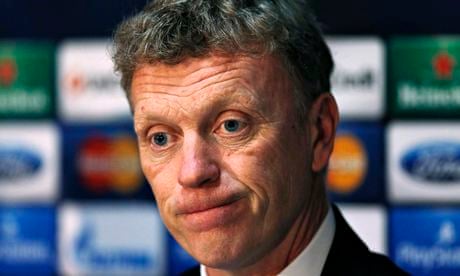David Moyes is not facing a cost of living crisis; we do not need to worry about his financial future. Whatever severance terms he finally agrees with Manchester United he will leave several million pounds richer.
But whether anyone, no matter how prominent or highly paid, should first hear about their sacking via the media is another matter. No employee ought to be publicly humiliated in this way. There should be dignity in labour – in the high street, at a call centre or in the football manager's dugout.
While the sport in which Moyes earns his living has sometimes been called the beautiful game, the treatment handed out to him and other football managers is decidedly ugly. At another United to the east of the Pennines, Leeds, a second manager has had it much worse: Brian McDermott was sacked and reinstated in the space of 24 hours at the beginning of February. As his team beat Huddersfield Town 5-1 he didn't know for sure whether he still had a job. The fans chanted their support for him and by Monday morning he was back in post. For the time being. As the season draws to a close it seems quite possible that the club's new owner, Massimo Cellino, could let him go all over again.
Football probably takes up too much media space already, and football talk can alienate those with no interest in or enthusiasm for the game. But this sport – or rather business – forms a large and unavoidable part of modern life. Its changing mores reflect to some degree the way life has changed more generally.
The most striking aspect of this is pay. While professional footballers in the fourth tier may not receive spectacular salaries – around £1,300-£1,500 a week – the average Premier League wage is about £25,000-£30,000 a week. Many of course get much more. This presents a management problem in itself, with the football coaches often paid rather less than their superstar staff. "How do you make a millionaire sweat?", as the late Bobby Robson once asked.
And yet, as Moyes now knows, even vast salaries cannot protect you from being treated harshly. In this respect, something of the ethos of casualisation and the precarious labour market has come even to the gilded world of modern football. No one, I think, has quite suggested putting players and managers on zero hours contracts – yet. Maybe it is only a matter of time.
Something slightly weird has happened to football – the working man's game, as it used to be called. The hooliganism and unsafe stadiums of the 1970s and 1980s have gone. Big money has come in, along with excellent if expensive subscription TV coverage. But tickets for top games are costly; many people cannot afford to see their team play live. This is still only a "working man's game" if the work you are doing is very well paid.
But then something slightly odd has happened to us all. The labour market has changed. Top pay has grown spectacularly in many sectors of the economy, while wages for the rest have remained flat. The concept of a career has altered dramatically. The government boasts about levels of job creation, yet too many of these jobs are poorly paid, insecure, unproductive and often only part time. A large proportion of the "new" jobs is made up by the newly self-employed – a good option for some, an inadequate and uncertain one for others.
So no, we do not need to worry about Moyes' personal finances. But that anguished look on his face tells you something else about how people at work – even the high and mighty – can be treated in 2014. Last May he signed a six-year contract of employment. Less than a year later he is out.

